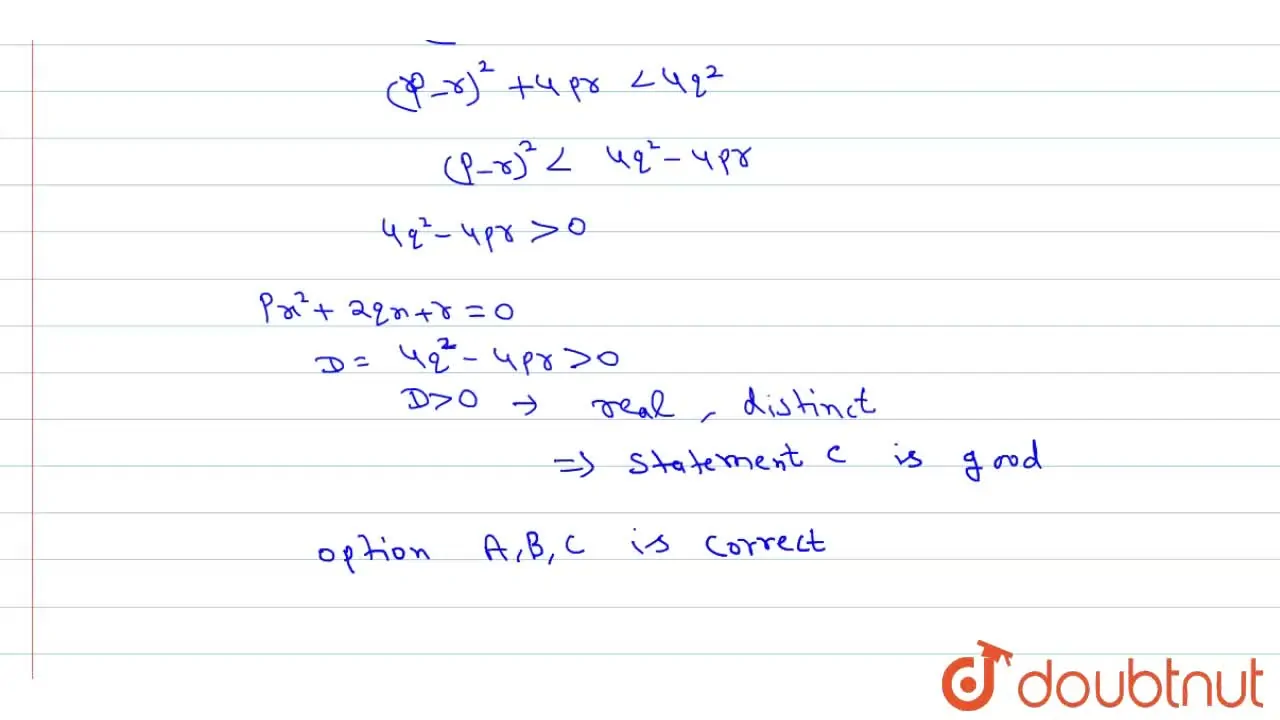If p,q,r each are positive rational number such tlaht p>q>r and the quadratic equation (p+q−2r)x2+(q+r−2p)x+(r+p−2q)=0 has a root in (−1,0) then which of the following statement hold good? (A) r+pq<2 (B) Both roots of given quadratic are rational (C) The equation px2+2qx+r=0 has real and distinct roots (D) The equation px2+2qx+r=0 has no real roots
r+pq<2
Both roots of given quadratic are rational
The equation px2+2qx+r=0 has real and distinct roots
The equation px2+2qx+r=0 has no real roots
The correct Answer is:A, B, C

∵f(1)=0
f(x)=(p+q−2r)x2(q+r−2p)x+(r+p−2q)
∴ one root is n=1
∴f(0)<0⇒r+p−2q<0⇒r+pq<2 (A)
Also product of roots =r+p−2qp+q−2p=α,1
(∵p,q,r are rational) ∴α is rational (B)
Also (r+p)<2q⇒(r+p)2<4q2
rArr ubrace(4q^(2) - 4pr)_("Discriminant")gtubrace((p - r)^(2))_("positive")
⇒ root of px2+2qx+τ=0are real and distinct (C)
Related Playlists
- BOOK - RESONANCECHAPTER - TEST PAPERSEXERCISE - Math105videos
TEST PAPERS
- BOOK - RESONANCECHAPTER - TEST PAPERSEXERCISE - MATHEMATICS263videos
TEST PAPERS
- BOOK - RESONANCECHAPTER - TEST PAPERSEXERCISE - PART - I MATHEMATICS SEC - 21videos
TEST PAPERS
- BOOK - RESONANCECHAPTER - TEST PAPEREXERCISE - CHEMISTRY37videos
TEST PAPER
- BOOK - RESONANCECHAPTER - TEST SERIESEXERCISE - MATHEMATICS131videos
TEST SERIES
Similar Questions
The roots of the equation (q−r)x2+(r−p)x+(p−q)=0 are :
View SolutionIf p,q,r and s are positive real numbers such that p+q+r+s=2, then M=(p+q)(r+s) satisfies the relation, when (A) 0<M≤1 (B) 1≤M≤2 .(C) 2≤M≤3 (D) 3≤M≤4
View SolutionThe roots of the given equation (p−q)x2+(q−r)x+(r−p)=0 are
View Solutionlf p,q,r∈R and the quadratic equation px2+qx+r=0 has no real root, then
View SolutionThe roots of the equation (p−q)x2+(q−r)x+(r−p)=0 are
View SolutionIf p, q, r are positive and are in AP, the roots of quadratic equation px2+qx+r=0 are real for :
View SolutionIf p,q,r are rational numbers. Then the root of the equation x2−2px+p2−q2+2qr−r2=0 are :
View SolutionIf p, q, r are real and p≠q, then the roots of the equation (p−q)x2+5(p+q)x−2(p−q)r are
View Solutionif p,q,r are real numbers satisfying the condition p + q +r =0 , then the roots of the quadratic equation 3px2+5qx+7r=0 are
View SolutionIf p,q,r are + ve and are in A.P., the roots of quadratic equation px2+qx+r=0 are all real for
View Solution


